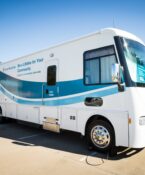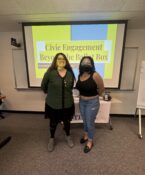Alcohol prevention strategies effective for American Indian teens and rural youth

A new study published in The American Journal of Public Health indicates that alcohol use among American Indian and white teens living in multicultural rural communities can be significantly reduced by community-based and individual-level prevention strategies.
UNT Health Science Center researcher Melvin Livingston, PhD, led the statistical design and analysis of the study, which was supported by the National Institute on Alcohol Abuse and Alcoholism (NIAA), part of the National Institutes of Health, and the National Institute on Drug Abuse. Dr. Livingston is Assistant Professor of Biostatistics and Epidemiology at UNTHSC’s School of Public Health.
“This study is one of the largest alcohol prevention trials ever conducted with an American Indian population, and the first to demonstrate the effectiveness of screening and brief counseling intervention in significantly reducing youth alcohol use at a community level,” said NIAAA Director George F. Koob, PhD.
American Indian teens and other rural youth initiate alcohol use at younger ages and have higher rates of alcohol-related problems than other groups. Early prevention is critical in these populations, but both American Indians and rural communities have been underrepresented in studies aimed at finding effective solutions for underage drinking.
To address this gap, a team of researchers led by Kelli A. Komro, PhD, of Emory University, worked with students in the Cherokee Nation, northeastern Oklahoma, to evaluate the effects of two strategies that previous research has indicated may be beneficial.
The first strategy, Communities Mobilizing for Change on Alcohol (CMCA), is a citizen-led community-organizing effort that holds local officials responsible for taking action to reduce alcohol access, use and consequences among underage youth.
The second strategy, called CONNECT, is a school-based, one-on-one health screening and brief intervention in which trained health coaches meet with students each semester to motivate healthy behaviors related to alcohol consumption.
High school students in six communities were randomly assigned to treatment or control conditions over a three-year period. Two communities received both intervention strategies, while students in two other communities received neither intervention strategy. Another community received only CMCA, and one received only CONNECT.
Results showed that alcohol use in the past 30 days, including any consumption and heavy drinking episodes (five or more drinks on at least one occasion), was significantly reduced among students receiving either or both of the interventions.
“The two distinct interventions alone and in combination resulted in similar patterns of effect across time,” said Dr. Komro, “but, interestingly, we found no evidence that the two interventions combined had significantly greater effects than either alone.”
“We found that community and school support and engagement in prevention is critical to shaping a more healthful environment for teens. Strategies such as ones conducted in this study should be further investigated with a focus on sustainability,” she said.
![Uyen Sa Nguyen Scaled[58]](https://www.unthsc.edu/newsroom/wp-content/uploads/sites/16/Uyen-Sa-Nguyen-scaled58-145x175.jpg)




Social media